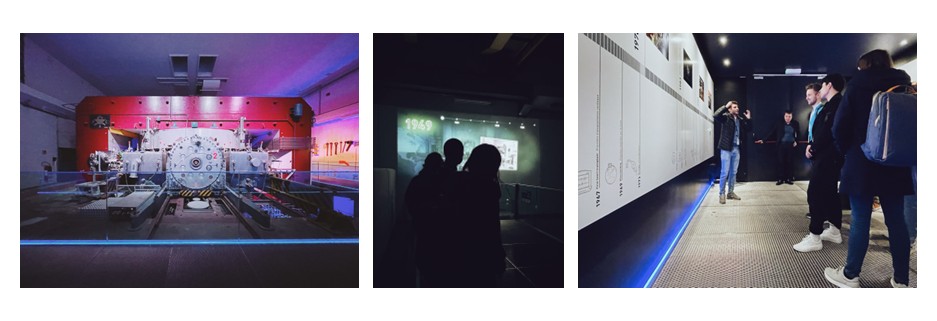SBPE meets CERN 2025
In collaboration with CERN and the VDI, Germany’s largest technical association, MSc Precision Engineering students visited CERN on an exclusive tour! Find out more about our experience at the world-famous research center through our impressions below.
On a pleasant Friday afternoon, a group of students and employees gathered in front of the visitor’s center at CERN in Geneva, awaiting the start of an exclusive tour. We were warmly welcomed by our expert guides, Dr. Thomas Sahner and Cédric Gerlach, who had carefully curated a special agenda focused on the purpose and history of CERN, as well as the field of precision engineering.
Discovering Metrology and Innovation at CERN
After a brief introduction, we split into two groups, and our journey began with a visit to the metrology department and the production workshop. Metrology, the science of measurement, plays a crucial role in the MSc Precision Engineering program, where students gain insight into this field through the course Metrology and Sensing in Industrial Environments This course is part of a broader concept of 21st-century skills, which includes a visit to METAS, the Federal Institute of Metrology. METAS also collaborates with our Graduate School for Precision Engineering, hosting the first PhD candidates who are currently completing their studies under their guidance.
During our visit, we were introduced to a micro-CT scanner and a handheld 3D scanner, which offer exceptional flexibility for digitizing objects of various sizes and shapes.
Next, we moved on to one of CERN's massive workshops, where we saw different areas of specialization, including metal manufacturing. These workshops combine additive manufacturing with traditional fabrication processes such as welding. As we moved from one workshop to another, we were amazed by the massive ultraprecision devices, including a milling machine of enormous scale. It was fascinating to see such large machines working with objects in the realm of millimeters and micrometers.
Unveiling CERN's History: The Synchrocyclotron and Particle Accelerators
Our next stop led us into a darker space, where we were introduced to the history and vision of CERN. Inside the building stood the first accelerator ever built: The Synchrocyclotron. This accelerator, which began operations in 1957, predates the first manned spaceflight! We were shown a projected visual explanation of how the Synchrocyclotron works, a truly captivating experience.
After this, we participated in an in-depth lecture on the physics of particle accelerators, gaining a deeper understanding of their functionality.
Exploring Materials Science: Insights into Surface Manipulation and Advanced Microscopy
Finally, we visited the mechanical and material workshops, where we were given an explanation on the manipulation of surfaces to create homogeneous structures. Digital microscopes were used to display intricate details of objects, and we were shown the Scanning Electron Microscope (SEM).
Material sciences are a fundamental part of the first semester of the MSc Precision Engineering program, providing a solid foundation for students. As the students of the specialization Ultraprecision Engineering progress into their Advanced Courses, they dive deeper into topics such as microscopes (SEM, Analytical Electron Microscopes, and micro-CTs) for material diagnostics.
Overall, the visit was a great success, and we would like to extend our thanks to Dr. Thomas Sahner and Cédric Gerlach for their time and enthusiasm in showing us the inner workings of CERN.

